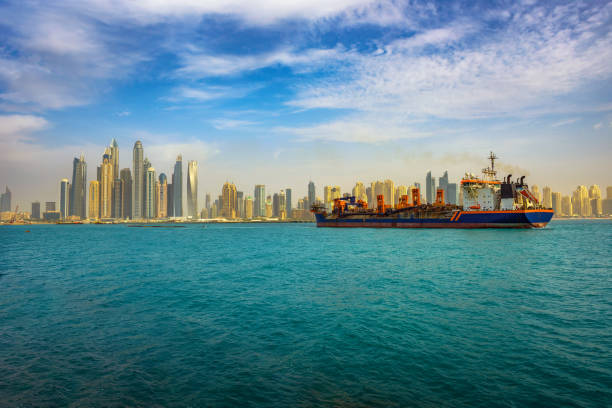
In the modern world of international trade, logistics plays a pivotal role in ensuring that goods flow smoothly across borders. Among the various modes of transportation, ocean freight stands out as one of the most efficient and cost-effective options for moving large volumes of goods over long distances. The shipping industry is responsible for transporting the majority of global trade, and ocean freight is its backbone. This method of transportation not only supports the economy but also fosters global connections. In this article, we will explore the significance of ocean freight, with a focus on its importance in regions like the UAE, and how businesses can benefit from it.
The Importance of Ocean Freight in Global Trade
Ocean freight is an essential component of global trade, especially for industries involved in the import and export of goods. Ships can carry large volumes of products, from raw materials to finished goods, across vast distances. This makes ocean freight a cost-effective option for moving goods between countries and continents. The massive size and capacity of cargo ships allow businesses to move goods in bulk, which reduces shipping costs and increases efficiency.
In the context of the UAE, ocean freight UAE is particularly significant due to the country’s strategic location as a global shipping hub. The UAE has several key ports, such as Jebel Ali Port in Dubai, which is one of the busiest ports in the world. This makes the UAE a central point for international trade, especially for goods traveling between Asia, Europe, and Africa. The country’s infrastructure, coupled with its maritime expertise, has established it as a leader in the global shipping industry. For businesses in the UAE, leveraging ocean freight offers unparalleled access to international markets at competitive prices.
The Process of Ocean Freight
The process of ocean freight involves several steps, each essential for ensuring that goods are transported safely and efficiently. The first step is booking space with a shipping company, which provides businesses with the necessary details for cargo transportation. After the booking, the goods are packed and prepared for shipping, ensuring that they meet all the requirements for safe transport. Depending on the nature of the goods, special containers or handling processes may be necessary.
Once the cargo is loaded onto the ship, it sails to its destination, where it is unloaded at the port. The goods are then transported via land to their final destination, completing the logistics chain. Throughout this process, businesses and logistics companies must work together to ensure that everything runs smoothly, from customs clearance to timely deliveries.
Benefits of Ocean Freight
There are several key benefits to choosing ocean freight for international shipping. One of the main advantages is cost-effectiveness. Ocean freight allows businesses to transport large quantities of goods at relatively low costs per unit, especially compared to air freight. This makes it an ideal option for businesses that need to ship bulk items over long distances.
Another benefit is the environmental impact. Ocean freight is a more sustainable form of transportation compared to air freight, as it produces less carbon emissions per ton of cargo. For businesses looking to minimize their environmental footprint, ocean freight is a greener alternative. Additionally, the global network of ports ensures that goods can be shipped to virtually any location around the world, making it highly versatile.
Challenges in Ocean Freight
While ocean freight is an effective and affordable method of transportation, it does come with some challenges. Weather conditions, port congestion, and political factors can sometimes cause delays, impacting the timely arrival of shipments. For businesses relying on just-in-time inventory systems, this can pose a significant challenge.
Moreover, ocean freight requires careful planning to ensure compliance with international regulations and standards. Customs clearance, import/export restrictions, and other legal requirements must be met for goods to cross borders smoothly. This can involve significant paperwork and coordination, which is why many businesses turn to freight forwarding companies for expertise in handling these complexities.
How Businesses Can Benefit from Ocean Freight
Businesses in the UAE and beyond can significantly benefit from utilizing ocean freight for their shipping needs. Whether they are looking to import raw materials or export finished products, ocean freight offers a reliable and cost-effective solution. With ports like Jebel Ali offering world-class infrastructure, businesses can efficiently transport goods worldwide, ensuring they stay competitive in the global market.
By partnering with reputable shipping companies and freight forwarders, businesses can optimize their shipping processes, avoid delays, and reduce costs. Moreover, by choosing ocean freight over other methods, companies can lower their carbon footprint and contribute to more sustainable trade practices.
Conclusion
Ocean freight is an indispensable part of global trade, offering a reliable and cost-effective way to move goods around the world. For businesses in the UAE, leveraging ocean freight UAE is especially beneficial due to the country’s prime location and advanced port facilities. While there are challenges to consider, the benefits far outweigh them, making ocean freight a popular choice for international shipping. As the global market continues to grow, the importance of ocean freight will only increase, making it a crucial part of any successful business strategy. By understanding the process and benefits of ocean freight, businesses can navigate international shipping with ease, ensuring their products reach customers across the globe.